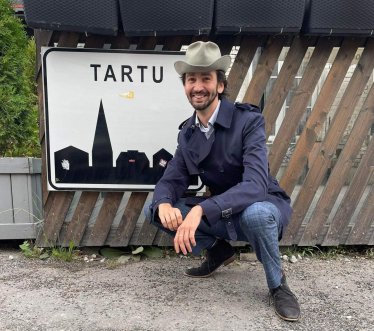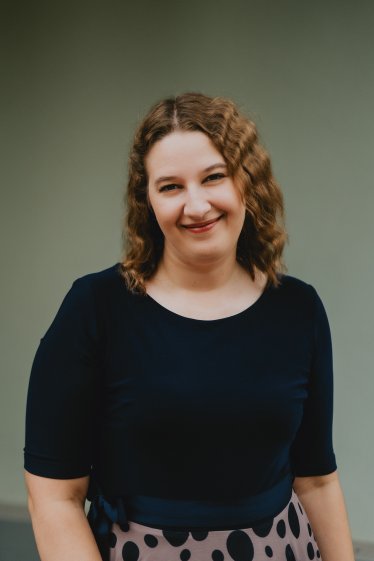3-Minute Thesis Competitions
Each year, the University of Tartu organises a 3-minute thesis competition for doctoral students. The event gives an opportunity to introduce one's research or a recent publication to the general public and other doctoral students either in Estonian or English.
In 2025, the competition takes place on 22 October.
Presentations will be video recorded on the site. All participants will be offered the possibility of publishing in the university's communication channels or in the media, so that exciting stories about research travel outside the walls of the university.
The best three presenters in Estonian will have an opportunity to represent the university at the Estonian Academy of Science competition “Science in Three Minutes“.
The best presenter in English will have the opportunity to represent the university at the international Coimbra Group 3-Minute Thesis competition.
< Back to Doctoral Studies Main Page

Participants: Only doctoral students who are not on academic leave or suspension of doctoral studies
Preparation: To participate in the competition, prepare a captivating three-minute presentation in Estonian or English summarising in a popular scientific style the problem that is driving your research, the ways to solve it, its preliminary results, relevance and impact.
Rules for presentations:
- A single static PowerPoint (.pptx) slide is permitted. No slide transitions or 'movement' of any description are allowed. The slide is to be presented from the beginning of the oration. Photos and visuals used on the slide must be licensed and properly cited.
- No additional electronic media (e.g. sound and video files) are permitted.
- No additional props (e.g. costumes, musical instruments, laboratory equipment) are permitted.
- Presentations are limited to 3 minutes maximum and competitors exceeding 3 minutes are disqualified.
- Presentations are to be spoken word (e.g. no poems, raps or songs).
- Presentations are to commence from the stage.
- Presentations are considered to have commenced when a presenter starts talking.
Evaluation:
The jury evaluates whether the presentation meets the requirements and selects three best speakers from the Estonian and the English competition, who will receive a cash prize. The decision of the jury is final.
The video recording of the winning presentation in English will be sent to the Coimbra Group’s international 3-Minute Thesis competition. In order to better prepare for the competition, watch the Coimbra Group 3MT Competition 2023 finals Youtube video, which explains the background information and rules in depth as well as shows the performance of the three finalists.
The best Estonian participants will get the opportunity to represent the university at the 3-minute thesis competition of the Estonian Academy of Sciences. The grand finals will be preceded by training sessions by the Academy of Sciences, which will give young researchers a hands-on experience of being in front of the camera and writing a popular science article.
Comprehension and content
- Did the presentation provide an understanding of the background and significance to the research question being addressed, while explaining terminology and avoiding jargon?
- Did the presentation clearly describe the impact and/or results of the research, including conclusions and outcomes?
- Did the presentation follow a clear and logical sequence?
- Was the thesis topic, research significance, results/impact and outcomes communicated in language appropriate to a non-specialist audience?
- Did the presenter spend adequate time on each element of their presentation - or did they elaborate for too long on one aspect or was the presentation rushed?
Engagement and communication
- Did the oration make the audience want to know more?
- Was the presenter careful not to trivialise or generalise their research?
- Did the presenter convey enthusiasm for their research?
- Did the presenter capture and maintain their audience's attention?
- Did the speaker have sufficient stage presence, eye contact and vocal range; maintain a steady pace, and have a confident stance?
- Did the PowerPoint slide enhance the presentation - was it clear, legible, and concise as well as properly cited?
- In three minutes, an average narrator is able to utter about 300 words. This is approximately 2600 characters and fits on one A4 page.
- It is recommended that you prepare the presentation carefully, and practice it repeatedly in front of the mirror.
- Avoid using foreign words or specific terms because, according to Albert Einstein, “If you can’t explain it to a six-year-old, you probably don’t understand it yourself”.
Speak to your audience
- Avoid jargon and academic language.
- Explain concepts and people important to your research – you may know all about the field but your audience may not.
- Highlight the outcomes of your research, and the desired outcome.
- Imagine that you are explaining your research to a close friend or fellow student from another field.
- Convey your excitement and enthusiasm for your subject.
Tell a story
- You may like to present your 3MT as a narrative, with a beginning, middle and end.
- It’s not easy to condense your research into three minutes, so you may find it easier to break your presentation down into smaller sections.
- Try writing an opener to catch the attention of the audience, then highlight your different points, and finally have a summary to restate the importance of your work.
Have a clear outcome in mind
- Know what you want your audience to take away from your presentation.
- Try to leave the audience with an understanding of what you’re doing, why it is important, and what you hope to achieve.
Revise
- Improve your 3MT presentation by reading it aloud, to yourself and to an audience of friends and family. Make sure you do not exceed 3 minutes!
- Ask for feedback.
- Ask your audience if your presentation clearly highlights what your research is about and why it is important.
Coimbra group competition
Competitions thoroughout the years, including video recordings
Jason Mario Dydynski (UT PhD student), second prize at the Coimbra Group 3MT competition in 2018.
UTTV
University of Tartu comppetition in 2024, video clips
University of Tartu competition in 2023, video clips
University of Tartu competition in 2022, video clips
University of Tartu competitions in 2020, video clips
Why participate in the three-minute thesis competition?
Imar Koutchuokali, junior research fellow at the School of Theology and Religious Studies, represented the University of Tartu at the international Coimbra Group 3-minute-thesis competition in 2021.

Why is it necessary to communicate your research to the general public in simple language?
In my experience, it is not uncommon for scientists and scholars who are at the top of their field to lose sight of the importance of their research for society as a whole. Similarly, people outside academia may not always be familiar with the terminology and language that we use on a daily basis. When academics are able to summarize their research and its relevance in clear and concise language, it can help bridge that gap. And if you are able to do so effectively, it means that you have a good grip on your own field. As my grammar teacher once said: if you can't explain it to your grandma, you don't really get it.
What does participation in the three-minute thesis competition give?
The elevator pitch gives young researchers a chance to learn if they are able to articulate complex theories and concepts clearly. One of the things with which it helped me personally is that I felt like I came to better understand my own research, too. I have had the experience that once you're deep into your own research rabbit hole, it is easy to lose perspective on your research as a whole. But when you're forced to summarize your thesis into a few brief sequences, it can help you regain that general oversight.
What words of advice would you give to a doctoral student participating in the competition?
Definitely participate! Even if everything goes wrong, it is still a fantastic learning experience that helps you ground your research so much better. And the recording process gives you an intense adrenaline rush.
Eleri Lillemäe, doctoral student in Sociology, took part in the English three-minute thesis competition in 2022.

Why is it necessary to communicate your research to the general public in simple language?
I'm sure I'm not the only one who has struggled to give simple, clear explanations, being used to talking about my research topic primarily to other researchers in the same field. Yet, when we think about why research is necessary, the answer is to benefit society. That is why I think it is important that we, as researchers, know how to communicate the content of our work in an understandable way, so that it is comprehensible to the wider audience. This was the biggest challenge for me when preparing the three-minute lecture. It made me look at my research in a new way and think about what the most important essence of my work is and how to convey this clearly and concisely.
What words of advice would you give to a doctoral student participating in the competition?
I have just one piece of advice for participants in the three-minute competition – practice, practice, and practice. The three minutes will go by faster than you might think, and every word and every sentence is well worth thinking about. That way, the message of the presentation will reach the audience in the most comprehensible way, and you will feel more confident while presenting.



